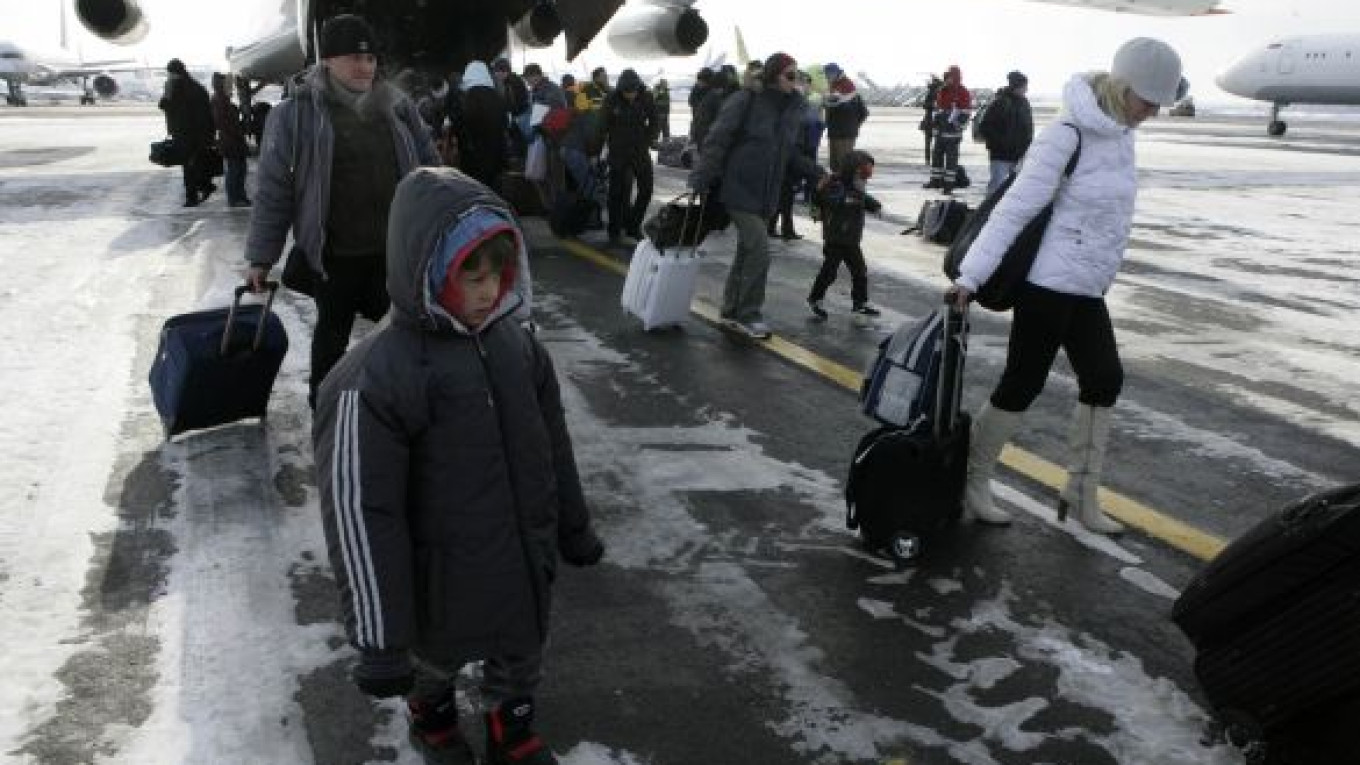Russian officials announced Wednesday that all Russian citizens had been airlifted from the capital of violence-torn Libya, but reports emerged about people stranded elsewhere in the country, including a group besieged by a bloodthirsty mob.
Three jets belonging to the Emergency Situations Ministry flew in to Moscow's Domodedovo Airport from Tripoli with 339 Russians as well as citizens of Armenia, Kazakhstan and Ukraine, news agencies said.
The fourth and last plane, carrying 16 ministry officials, was to arrive to Moscow late Wednesday.
Days of bloodshed continued in Tripoli, but the infighting did not reach the city airport, allowing the planes to leave, Channel One television reported.
But about 1,000 more Russians remained in the country and were to be evacuated by ferries, Ekho Moskvy radio said.
A camp hosting an unspecified number of Russians, Turks and natives of other Arab countries was surrounded by an angry mob in the city of Ras Lanuf, where a rail welding plant was built by a Russian company last year, an employee of the Russian Kalugatekhmash factory, Alexander Vorkachyov, told the radio station.
Vorkachyov did not elaborate but said military intervention was required.
Emergency Situations Ministry representatives said they learned about the Ras Lanuf crisis from Ekho Moskvy and promised to look into the situation.
Tajikistan also requested Russian help in evacuating some two dozen students stranded in Libya, and Ukraine dispatched a plane to evacuate its citizens Wednesday, RIA-Novosti said, adding that anywhere from 180 to 3,000 Ukrainians remain in the country.
Most Russian evacuees are employees of companies working in Libya, including Gazprom and Russian Railways.
Photos from Domodedovo Airport showed passengers, some with children, hugging their loved ones. Non-Muscovites were accommodated in hotels, and psychological help was provided for all passengers and their relatives, the Emergency Situations Ministry said.
No Russians have been killed or injured in Libya, but evacuees told reporters upon arrival at Domodedovo Airport that they have heard street gunfire and had been afraid to venture outside for days.
"It was quiet in the town where we lived, but it was a real war in the neighboring district," Almira Safina, a Tatarstan native whose husband works as an interpreter for Tatneft, told Lifenews.ru.
The Emergency Situations Ministry opened a hotline for relatives to report about loved ones who may remain in Libya.
The European Union has flown home some 10,000 people from Libya, and Turkey was conducting the biggest evacuation operation in its history, seeking to bring back 25,000 its citizens as well as 3,000 Thai and Vietnamese employees of Turkish companies, news agencies said. The United States has chartered a ferry with a capacity of 600 to evacuate its citizens.
Italy said Wednesday that more than 1,000 people have been killed in Libya since an uprising against Moammar Gadhafi, the 82-year-old unelected leader who has ruled the country for 42 years, began last week.
Gadhafi refused to quit, calling protesters "rats and mercenaries" in a speech Tuesday. But news reports said his own safety now largely rests on mercenaries from nearby Chad who are the only troops besides his own tribe, the Gadhadhfa, to remain unquestionably loyal to him.
France and Germany threatened Wednesday to seek EU sanctions on Libya for crackdowns on protesters. The UN Security Council has also criticized the crackdowns.
A Message from The Moscow Times:
Dear readers,
We are facing unprecedented challenges. Russia's Prosecutor General's Office has designated The Moscow Times as an "undesirable" organization, criminalizing our work and putting our staff at risk of prosecution. This follows our earlier unjust labeling as a "foreign agent."
These actions are direct attempts to silence independent journalism in Russia. The authorities claim our work "discredits the decisions of the Russian leadership." We see things differently: we strive to provide accurate, unbiased reporting on Russia.
We, the journalists of The Moscow Times, refuse to be silenced. But to continue our work, we need your help.
Your support, no matter how small, makes a world of difference. If you can, please support us monthly starting from just $2. It's quick to set up, and every contribution makes a significant impact.
By supporting The Moscow Times, you're defending open, independent journalism in the face of repression. Thank you for standing with us.
Remind me later.


